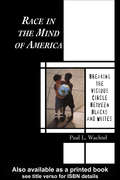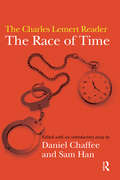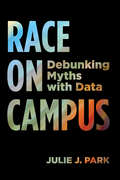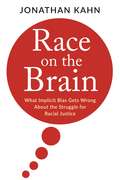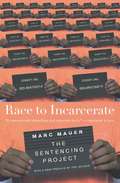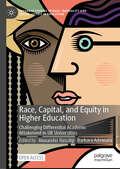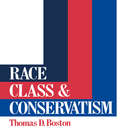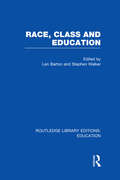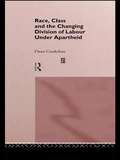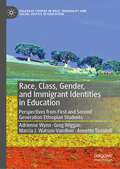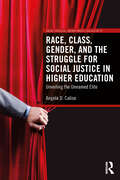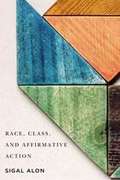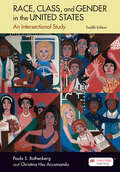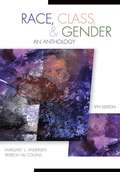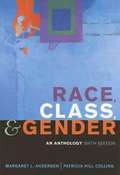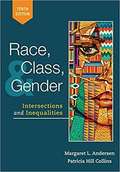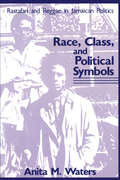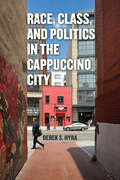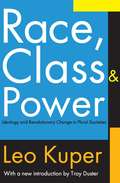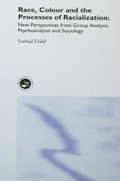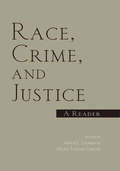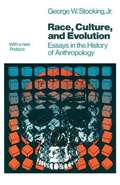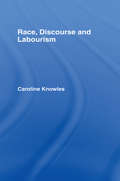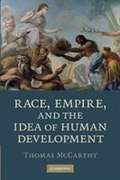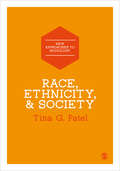- Table View
- List View
Race in the Mind of America: Breaking the Vicious Circle Between Blacks and Whites
by Paul L. WachtelInternationally recognized psychologist Paul L. Wachtel sheds new light on the psychological foundations of our nation's racial impasse and applies his pathbreaking "vicious circle" approach to help resolve it. This timely and fascinating analysis shows how the ways we attempt to cope with racial tensions and inequalities often lead to the perpetuation of our difficulties rather than their resolution. Understanding the ironies that characterize contemporary race relations is the first step toward extricating our nation from the vicious circle.Both controversial and healing, Race in the Mind of America challenges the orthodoxies that shape black and white opinion and liberal and conservative policies while sensitively exploring the way the world looks to both sides and why it looks that way. Wachtel probes the daily experiences of blacks and whites, shedding new light on how individual experiences and larger social, historical and economic forces continually re-create each other. In illustrating how blacks and whites get caught in vicious circles that sustain the very behaviors and attitudes they wish would change, Wachtel also points toward the concrete solutions to our seemingly enduring dilemmas and shows how to move beyond the adversarial rhetoric that divides us.
Race of Time: A Charles Lemert Reader
by Daniel Chaffee Samuel HanCharles Lemert is one of the most renowned critics of social theory and theorists today. The editors of this book have offered and contextualised many of his best essays and situated them against the backdrop of American sociology. The breadth of Lemert's work doesn't stop at an academic engagement with theoretical debates such as 'globalisation' or 'postmodernism,' but cuts right to the heart of abiding social issues. His work is focused and continues to probe pressing questions such as the rise of vulnerabilities in an era of new capitalism. By weaving together personal narrative, research, lucid explanations, and a dynamic engagement with social theory of old and new, his unique prose renders accessible complex theoretical debates.
Race on Campus: Debunking Myths with Data
by Julie J. Park2020 Critics' Choice Book Award, American Educational Studies Association (AESA) In Race on Campus, Julie J. Park argues that there are surprisingly pervasive and stubborn myths about diversity on college and university campuses, and that these myths obscure the notable significance and admirable effects that diversity has had on campus life. Based on her analysis of extensive research and data about contemporary students and campuses, Park counters these myths and explores their problematic origins. Among the major myths that she addresses are charges of pervasive self-segregation, arguments that affirmative action in college admissions has run its course and become counterproductive, related arguments that Asian Americans are poorly served by affirmative action policies, and suggestions that programs and policies meant to promote diversity have failed to address class-based disadvantages. In the course of responding to these myths, Park presents a far more positive and nuanced portrait of diversity and its place on American college campuses. At a time when diversity has become a central theme and goal of colleges and universities throughout the United States, Race on Campus offers a contemporary, research-based exploration of racial dynamics on today&’s college campuses.
Race on the Brain: What Implicit Bias Gets Wrong About the Struggle for Racial Justice
by Jonathan KahnOf the many obstacles to racial justice in America, none has received more recent attention than the one that lurks in our subconscious. As social movements and policing scandals have shown how far from being “postracial” we are, the concept of implicit bias has taken center stage in the national conversation about race. Millions of Americans have taken online tests purporting to show the deep, invisible roots of their own prejudice. A recent Oxford study that claims to have found a drug that reduces implicit bias is only the starkest example of a pervasive trend. But what do we risk when we seek the simplicity of a technological diagnosis—and solution—for racism? What do we miss when we locate racism in our biology and our brains rather than in our history and our social practices?In Race on the Brain, Jonathan Kahn argues that implicit bias has grown into a master narrative of race relations—one with profound, if unintended, negative consequences for law, science, and society. He emphasizes its limitations, arguing that while useful as a tool to understand particular types of behavior, it is only one among several tools available to policy makers. An uncritical embrace of implicit bias, to the exclusion of power relations and structural racism, undermines wider civic responsibility for addressing the problem by turning it over to experts. Technological interventions, including many tests for implicit bias, are premised on a color-blind ideal and run the risk of erasing history, denying present reality, and obscuring accountability. Kahn recognizes the significance of implicit social cognition but cautions against seeing it as a panacea for addressing America’s longstanding racial problems. A bracing corrective to what has become a common-sense understanding of the power of prejudice, Race on the Brain challenges us all to engage more thoughtfully and more democratically in the difficult task of promoting racial justice.
Race to Incarcerate
by Marc MauerIn this revised edition of his seminal book on race, class, and the criminal justice system, Marc Mauer, executive director of one of the United States' leading criminal justice reform organizations, offers the most up-to-date look available at three decades of prison expansion in America.Including newly written material on recent developments under the Bush administration and updated statistics, graphs, and charts throughout, the book tells the tragic story of runaway growth in the number of prisons and jails and the overreliance on imprisonment to stem problems of economic and social development. Called "sober and nuanced" by Publishers Weekly, Race to Incarcerate documents the enormous financial and human toll of the "get tough" movement, and argues for more humane-and productive-alternatives.
Race, Capital, and Equity in Higher Education: Challenging Differential Academic Attainment in UK Universities (Palgrave Studies in Race, Inequality and Social Justice in Education)
by Alexander Hensby Barbara AdewumiThis book examines the structural and cultural factors that explain the persistence of an attainment gap between white and Black, Asian, and Minority Ethnic (BAME) students in UK universities. So-called ‘deficit’ approaches have long represented the orthodoxy in higher education strategy-making, yet they overlook the structural and institutional factors that reproduce attainment gaps. Whereas students already in possession of the right ‘academic capital’ are made to feel validated and empowered in their learning, BAME students – particularly those from working class backgrounds – may feel marginalised by dominant hierarchical cultures on campus.This book provides an important and unique contribution to the study of racial equity in higher education. Its chapters provide a breadth and depth of analyses which help explain the roots of the attainment gap, while offering reflections and commentaries on the necessary steps that universities must take in order to ensure equityfor students from all backgrounds.
Race, Class and Conservatism
by Thomas D BostonFirst Published in 1988. Routledge is an imprint of Taylor & Francis, an informa company.
Race, Class and Education (Routledge Library Editions: Education)
by Stephen Walker Len BartonOne problem which continues to absorb social scientists is the way in which so much social deprivation stems from racial or class status. The discussion in this book is developed in two ways: firstly, careful attention is given to an examination of the way minority groups create and maintain collective identities and action. Secondly, the relationship between this movement and such topics as racism in schools, schooling, unemployment and West Indian involvement in sporting rather than academic activities is analysed, together with the nature of the educational experience of different class and gender groups.
Race, Class and the Changing Division of Labour Under Apartheid
by Owen CrankshawAs the only comprehensive empirical analysis of the changing racial and occupational structure of the urban workforce in South Africa under apartheid, this study will make an invaluable contribution to our understanding of the complex inter-relations of past and present racial inequality and economic development in South Africa.
Race, Class, Gender, and Immigrant Identities in Education: Perspectives from First and Second Generation Ethiopian Students (Palgrave Studies in Race, Inequality and Social Justice in Education)
by Greg Wiggan Marcia J. Watson-Vandiver Adrienne Wynn Annette TeasdellThis volume addresses the underlying intersections of race, class, and gender on immigrant girls’ experiences living in the US. It examines the impact of acculturation and assimilation on Ethiopian girls’ academic achievement, self-identity, and perception of beauty. The authors employ Critical Race Theory, Critical Race Feminism, and Afrocentricity to situate the study and unpack the narratives shared by these newcomers as they navigate social contexts rife with racism, xenophobia, and other forms of oppression. Lastly, the authors examine the implications of Ethiopian immigrant identities and experiences within multicultural education, policy development, and society.
Race, Class, Gender, and the Struggle for Social Justice in Higher Education: Unveiling the Unnamed Elite (New Critical Viewpoints on Society)
by Angela D. CaliseOffering readers an insightful exploration of the challenges faced by leaders in higher education as they navigate the complexities of promoting social justice and caring for minoritized populations, this book delves into their untold stories to reveal the triumphs and struggles of these influential individuals.By unveiling the undercurrents of higher education and the hidden dynamics at play, Race, Class, Gender, and the Struggle for Social Justice in Higher Education details the battle for social justice and the experiences of leadership elites, serving as an invaluable resource for anyone passionate about the intersection of leadership, social justice, and the imperative to create inclusive environments in higher education, shedding light on leaders’ motivations, behaviors, and barriers in advancing social justice on college campuses.This book will be relevant to instructors and students in higher education, leadership, and sociology courses, offering insights into the challenges faced by leadership elites in promoting social justice and supporting marginalized populations.
Race, Class, and Affirmative Action
by Sigal AlonNo issue in American higher education is more contentious than that of race-based affirmative action. In light of the ongoing debate around the topic and recent Supreme Court rulings, affirmative action policy may be facing further changes. As an alternative to race-based affirmative action, some analysts suggest affirmative action policies based on class. In Race, Class, and Affirmative Action, sociologist Sigal Alon studies the race-based affirmative action policies in the United States. and the class-based affirmative action policies in Israel. Alon evaluates how these different policies foster campus diversity and socioeconomic mobility by comparing the Israeli policy with a simulated model of race-based affirmative action and the U.S. policy with a simulated model of class-based affirmative action. Alon finds that affirmative action at elite institutions in both countries is a key vehicle of mobility for disenfranchised students, whether they are racial and ethnic minorities or socioeconomically disadvantaged. Affirmative action improves their academic success and graduation rates and leads to better labor market outcomes. The beneficiaries of affirmative action in both countries thrive at elite colleges and in selective fields of study. As Alon demonstrates, they would not be better off attending less selective colleges instead. Alon finds that Israel’s class-based affirmative action programs have provided much-needed entry slots at the elite universities to students from the geographic periphery, from high-poverty high schools, and from poor families. However, this approach has not generated as much ethnic diversity as a race-based policy would. By contrast, affirmative action policies in the United States have fostered racial and ethnic diversity at a level that cannot be matched with class-based policies. Yet, class-based policies would do a better job at boosting the socioeconomic diversity at these bastions of privilege. The findings from both countries suggest that neither race-based nor class-based models by themselves can generate broad diversity. According to Alon, the best route for promoting both racial and socioeconomic diversity is to embed the consideration of race within class-based affirmative action. Such a hybrid model would maximize the mobility benefits for both socioeconomically disadvantaged and minority students. Race, Class, and Affirmative Action moves past political talking points to offer an innovative, evidence-based perspective on the merits and feasibility of different designs of affirmative action.
Race, Class, and Gender in the United States: An Intersectional Study
by Christina Hsu Accomando Paula RothenbergAn intersectional anthology featuring readings about race, class, gender, sexuality, disability, immigration, and many other topics by leading thinkers, scholars, and activists.
Race, Class, and Gender: An Anthology
by Patricia Hill Collins Margaret L. AndersenEach reading addresses a timely-and often controversial-topic, such as health care inequality, undocumented students, domestic violence, genetic technologies, and the effect of the media on body image, thereby giving readers a multidimensional perspective on a number of social issues.
Race, Class, and Gender: An Anthology (6th edition)
by Patricia Hill Collins Margaret L. AndersenThis anthology introduces students to how race, class, and gender shape the experiences of diverse groups in the U.S. Introductory essays for each of the four sections stress the interconnectedness of these various types of difference. Each section concludes with some suggestions for further reading. The sixth edition contains 19 new readings dealing with such issues as affirmative action, immigration, and military rank.
Race, Class, and Gender: Intersections and Inequalities
by Patricia Hill Collins Margaret L. AndersenTimely, relevant and extremely student-friendly, Andersen/Hill Collins' RACE, CLASS, AND GENDER: INTERSECTIONS AND INEQUALITIES, 10th edition, equips you with a multidimensional perspective on today's social issues. Written by two leading authorities in the field, this classic anthology uses a diverse collection of writings by a variety of scholars to demonstrate how the complex intersection of people's race, class, gender and sexuality shapes their experiences in U.S. society. Professors Andersen and Hill Collins begin each section with in-depth introductions to provide an analytical framework for understanding social inequality. Completely up-to-date, the readings cover current--and often controversial topics--including undocumented students, myths about immigrant crime, growing inequality, the role of social media in social movement mobilization, health care inequality and more.
Race, Class, and Political Symbols: Rastafari and Reggae in Jamaican Politics
by Anita M. WatersDr. Waters is one of a new breed of analysts for whom the interpenetration of politics, culture, and national development is key to a larger integration of social research. Race, Class, and Political Symbols is a remarkably cogent examination of the uses of Rastafarian symbols and reggae music in Jamaican electoral campaigns. The author describes and analyzes the way Jamaican politicians effectively employ improbable strategies for electoral success. She includes interviews with reggae musicians, Rastafarian leaders, government and party officials, and campaign managers. Jamaican democracy and politics are fused to its culture; hence campaign advertisements, reggae songs, party pamphlets, and other documents are part of the larger picture of Caribbean life and letters. This volume centers and comes to rest on the adoption of Rastafarian symbols in the context of Jamaica's democratic institutions, which are characterized by vigorous campaigning, electoral fraud, and gang violence. In recent national elections, such violence claimed the lives of hundreds of people. Significant issues are dealt with in this cultural setting: race differentials among Whites, Browns, and Blacks; the rise of anti-Cubanism; the Rastafarians' response to the use of their symbols; and the current status of Rastafarian ideological legitimacy.
Race, Class, and Politics in the Cappuccino City
by Derek S. HyraFor long-time residents of Washington, DC’s Shaw/U Street, the neighborhood has become almost unrecognizable in recent years. Where the city’s most infamous open-air drug market once stood, a farmers’ market now sells grass-fed beef and homemade duck egg ravioli. On the corner where AM.PM carryout used to dish out soul food, a new establishment markets its $28 foie gras burger. Shaw is experiencing a dramatic transformation, from “ghetto” to “gilded ghetto,” where white newcomers are rehabbing homes, developing dog parks, and paving the way for a third wave coffee shop on nearly every block. Race, Class, and Politics in the Cappuccino City is an in-depth ethnography of this gilded ghetto. Derek S. Hyra captures here a quickly gentrifying space in which long-time black residents are joined, and variously displaced, by an influx of young, white, relatively wealthy, and/or gay professionals who, in part as a result of global economic forces and the recent development of central business districts, have returned to the cities earlier generations fled decades ago. As a result, America is witnessing the emergence of what Hyra calls “cappuccino cities.” A cappuccino has essentially the same ingredients as a cup of coffee with milk, but is considered upscale, and is double the price. In Hyra’s cappuccino city, the black inner-city neighborhood undergoes enormous transformations and becomes racially “lighter” and more expensive by the year.
Race, Class, and Power: Ideology and Revolutionary Change in Plural Societies
by Leo KuperExamining in detail the apparently inexorable polarization of society in such countries as Rwanda, Algeria, and South Africa, the author questions whether current theories correctly explain the past or offer adequate guides for the future. In their place he puts forward an alternative neo-Durkheimian view of the possibility of non-violent revolutionary change, based on the development of such social and cultural continuities as already exist within each plural society. But he warns that -this is an age of passionate commitment to violence in which vicarious killers abound in search of a Vietnam of their own.- The aim of this groundbreaking and challenging book is to create theoretical perspectives in which to view the racial conflict of plural societies. Written in the turbulent early 1970s, the book demonstrates the inadequacy of then prevailing views such as Marxist interpretations of racial conflict as class struggle, and the Fanon a priori rejection of non-violent techniques of change, which Kuper holds responsible for the acceptance of what he calls -the platitudes of violence.- The book concludes with more personal sections focusing on the author's struggles with the then prevailing South African society, critiques of that, and censorship of his attempts to make these public. In the light of subsequent changes in South Africa many decades later, this book serves not only as an important work of political sociology but as a personal testament to the fight against racism in South Africa. Leo Kuper was professor of sociology and director of the African Studies Center at the University of California, Los Angeles. A South African by birth, he was one of the first writers on genocide as well as other aspects of African studies and urban sociology. His major book, Genocide (Penguin, 1981), remains in print. The Leo Kuper Foundation is a non-governmental organization dedicated to the eradication of genocide through research, advice, and education. It was created in Washington, DC in 1994 following the death of Leo Kuper, with the aim of improving measures to prevent genocide. The main area of work for the past five years has been in support of the creation of an International Criminal Court. Troy Duster is director at the Institute for the History of the Production of Knowledge, New York University.
Race, Colour and the Processes of Racialization: New Perspectives from Group Analysis, Psychoanalysis and Sociology
by Farhad DalalIs racial conflict determined by biology or society?So many conflicts appear to be caused by racial and ethnic differences; for example, the cities of Britain and America are regularly affected by race riots. It is argued by socio-biologists and some schools of psychoanalysis that our instincts are programmed to hate those different to us by evolutionary and developmental mechanisms. This book argues against this line, proposing an alternative drawing on insights from diverse disciplines including anthropology, social psychology and linguistics, to give power-relations a critical explanatory role in the generation of hatreds. Farhad Dalal argues that people differentiate between races in order to make a distinction between the 'haves' and 'must-not-haves', and that this process is cognitive, emotional and political rather than biological. Examining the subject over the past thousand years, Race, Colour and the Processes of Racialisation covers:* psychoanalytic and other theories of racism* a new theorisation of racism based on group analytic theory* a general theory of difference based on the works of Fanon, Elias, Matte-Blanco and Foulkes* application of this theory to race and racism.Farhad Dalal concludes that the structures of society are reflected in the structures of the psyche, and both of these are colour coded. This book will be invaluable to students, academics and practitioners in the areas of psychoanalysis, group analysis, psychotherapy and counselling.
Race, Crime, and Justice: A Reader
by Shaun L. Gabbidon Helen Taylor GreeneA comprehensive collection of the essential writings on race and crime, this important Reader spans more than a century and clearly demonstrates the long-standing difficulties minorities have faced with the justice system. The editors skillfully draw on the classic work of such thinkers as W.E.B. DuBois and Gunnar Myrdal as well as the contemporary work of scholars such as Angela Davis, Joan Petersilia, John Hagen and Robert Sampson. This anthology also covers all of the major topics and issues from policing, courts, drugs and urban violence to inequality, racial profiling and capital punishment. This is required reading for courses in criminology and criminal justice, legal studies, sociology, social work and race.
Race, Culture, and Evolution: Essays in the History of Anthropology (With a new Preface)
by George W. StockingThe essays in this book are an attempt to answer a query posed by Oscar Handlin more than a decade ago in discussing Race and Nationality in American Life: "What Happened to Race?"
Race, Discourse and Labourism (International Library of Sociology)
by Caroline KnowlesRace, Discourse and Labourism argues that the commonwealth of socialism is founded upon a well-concealed history of brutality and repression. Caroline Knowles details the historical conditions of the emergence of race through Labour's dealings with Indian independence negotiations and anti-semitism in the thirties, and the effects of this on the conceptions of black citizenship, multi-racialism and black representation in labour politics.
Race, Empire, and the Idea of Human Development
by Thomas McCarthyThomas McCarthy analyzes the ideologies of race and empire that were integral to European-American expansion. He highlights the central role that conceptions of human development played in answering challenges to legitimacy through a hierarchical ordering of difference.
Race, Ethnicity & Society (New Approaches to Sociology)
by Tina G. PatelPart of the New Approaches to Sociology series, Race, Ethnicity & Society, expands on Tina Patel′s acclaimed book Race and Society. Offering a thoughtful and critically engaging exploration of some of the key issues around race and ethnicity in contemporary society, this book provides a nuanced and impactful perspective for students studying sociology. With a progressive approach that emphasises the social construction of race issues within a post-racial era, moving away from essentialist and polarized explanations of raced interaction, this book: Introduces the main concepts and key theories, including their post-developments Includes dedicated chapters on theorizing race and historical context Focuses on the processes and impact of racial categorisation in contemporary society Covers contemporary discussions related to #BlackLivesMatter and the Covid 19 pandemic Race, Ethnicity & Society is packed with topical examples and international case studies to engage students, along with chapter summaries, study questions and further reading. It′s a highly readable and thought-provoking guide to the study of race, ethnicity and society for students of sociology, criminology and related disciplines. Dr Tina G. Patel is a Senior Lecturer in Criminology at the University of Salford
